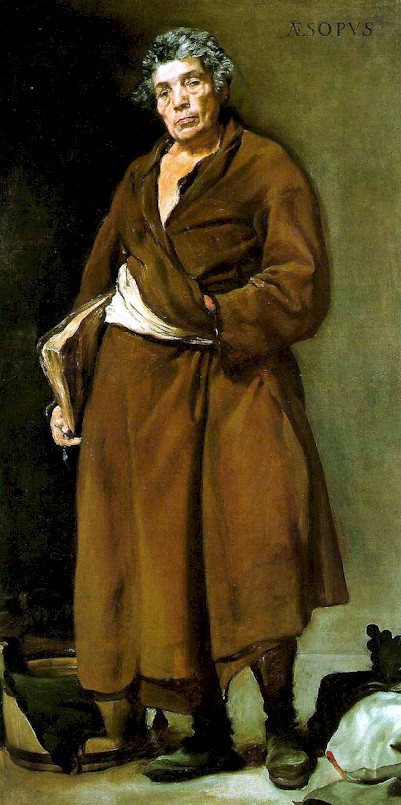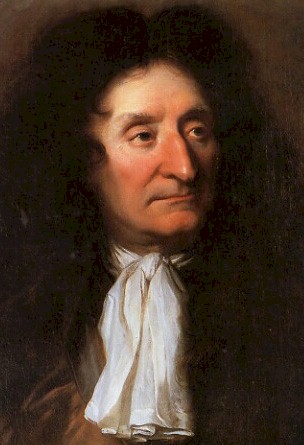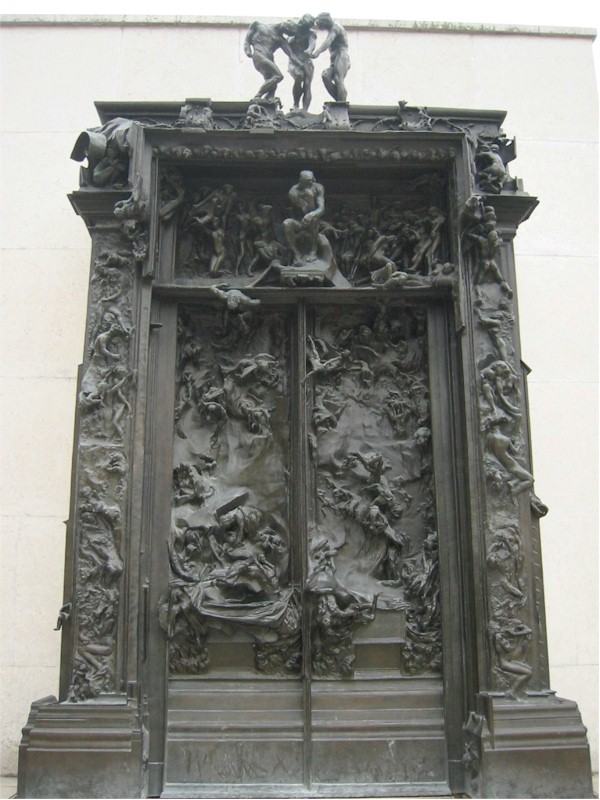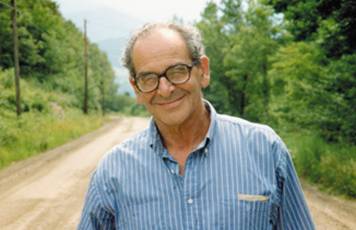Мы продолжаем напряженно работать, чтобы улучшить наш сайт и перевести его на другие языки. Русская версия этой страницы еще не совсем готова. Поэтому мы представляем здесь пока английскую версию. Мы благодарим вас за понимание.
Маскировка и иерархической сдвиг
Masking
One of the style elements Bulgakov often uses is called masking. The role of the secret police, for instance, is often described in a subtle, almost hidden way, though it is very important, since almost all of the characters are arrested in the course of the novel. Bulgakov uses Aesopian language to describe the activities of the secret police - or the results of it. Aίσωπος - Aisopos (620BC-560BC) was a Greek poet, especially known by his beast fables.

The Greek poet Aisopos
The fables of Aisopos were the source of inspiration of the French poet Jean de la Fontaine (1621-1695). By his fables he could safely express social criticism. An Aesopian language is thus a use of words having an innocent meaning to outsiders, but which is very significant for insiders or those who are informed. The Russian language offers many possibilities to do this and Bulgakov uses it in abundance. The translators must have had a tough job. When the master tells to Ivan that he was «in the same coat but with the buttons torn off», the informed reader knows that he had been arrested. Because in Stalin's Soviet Union the buttons of the clothes of arrested people were torn off.

Jean de la Fontaine
Bulgakov never mentions the secret police by its name. Sometimes he used undefinite nouns like «a citizen entered and whispered something», sometimes vague general descriptions like «a certain Moscow institution», sometimes verbs with no logical agens, suggesting that the victims themselves were the cause of what happened like in «people began to disappear without a trace», or «On the third day, Anna Frantsevna, who had suffered all the while from insomnia, again left hurriedly for her dacha... Needless to say, she never came back!», sometimes he described a result or an effect of what happened without referring to the cause like in «he paled» or «The entering one whispered something to the seated one, and he, thoroughly upset, rose from his chair, and a few seconds later Poplavsky found himself alone in the empty management room».
The masking was not always meant to criticize. Sometimes it's just funny, or maybe just to give a feeling of recognition to the informed reader. When, for instance, Woland looks over Moscow after the events, and just before the company will return to the gates of hell, he is sitting there «hunched on the stool», and «resting his sharp chin on his fist with one leg drawn under him». That's exactly the same pose as the statue The Thinker of the French sculpturer Auguste Rodin (1840-1917). Nothing special at first sight, unless you know that this statue, which is now famous all over the world on itself, was created 1880 as a part of a monumental gate which Rodin had designed for a newly planned museum for decorative arts, the École des Arts Decoratifs in Paris. The gate was named The Gates of Hell, and in the specifications was mentionned that it had to be based on the Divina Commedia of the Italian writer Dante degli Alighieri (1265-1321). And to this work happened what almost happened to The Master and Margarita: it was never finished.

The Gates of Hell with The Thinker
Illusion or reality
Another style element used by Bulgakov is the hierarchical shift. He turns worlds upside down. Moscow, which was in the ban of social sealism in Bulgakov's time, and where atheism was the norm, is dominated by the magic of the devil - who, by definition, can only exist if there exists a God too. And the biblical story line, taking place in a world where, according to historiscal writings, symbolism and all possible forms of religious perception gave something to hold on to everything which still was unknown, unexplored and unexplained, is described by Bulgakov as a world that is subject to the laws of rational reality. The motives of the characters are explained, Aphranius is called explicitely «the chief of the secret police», and Kaifa's manipulations are revealed extensively and in a detailed way.
When the characters in The Master and Margarita are confronted with a inexplicable threath, they often hesitate between two possibilities: it's either an illusion, either supranatural. Bulgakov regularly shifts consciously the supranatural with reality. And the real threats are not coming from the supranatural, but from the daily Soviet reality. So very different from what the Soviet authorities were saying. To them the believing in the supranatural was dangerous and subversive, or a manoeuvre of the ennemies of socialism, and thus saboteurs.
The power of words
In the Soviet Union the word was extremely important. Up to the ultimate absurdity. When something was named, it existed, when something was concealed, it did not exist. Professor Efim Grigorievich Etkind (1918-1999) of the Paris Sorbonne, who had to leave the Soviet Union in 1974 under pressure of the KGB, described it as follows in an article entitled Soviet Taboos: «То, чего мы не признаем официально - призрак, фантом, небытие. То, чего мы не признаем, утрачивает реальность» or «What we don't recognize officially is a shadow, a ghost, non existing. What we don't give a name loses reality». It reminds of what the master said: «Раз нет документа, нету человека» or «No documents, no person».

Efim Grigorievich Etkind
But the opposite is also true. When certain words or notions - or, by extension, opinions - are repeated often enough, they become reality. The Soviet era was characterized by this kind of indoctrination. The denial of the reality which was created this way could be considered as subversive. Yes, even forgetting it could be punished. The Kirghiz writer Chingiz Torekylovich Aitmatov, (1828-2008) who has been ambassador of his country to the NATO, the European Union and Belgium, describes in his book The Day Lasts More Than a Hundred Years, how a man was arrested because he had forgotten to mention to an Englishman that World War II could never have been won without Stalin's genius. And in his novella An Incident at Krechetovka Station, Alexander Isaevich Solzhenitsyn (1918-2008) describes an incident he observed in one of the many shunting-yards during World War II. In the novella, The Soviet citizen Tveritinov is arrested because he asked Lieutenant Vasili Zotov what the previous name of Stalingrad was. Zotov suspects that he is a spy and has him arrested. Later, Zotov twice asks about the actor only to be told that he «has been taken care of» and «we never make mistakes», leaving the reader to guess Tveritinov's fate.

Alexander Isaevich Solzhenitsyn
Saying something or not saying something. It could qualify the correctness of your political opinion. The Lithuanian engineer and writer Czeslaw Milosz (1911-2004) went one step further: «Even your gestures, the intonation of your voice, or your preference for a tie could, with the use of the right words, be interpreted as an expression of your political disposition - good or bad, it depends...»
With the using of words to create or interprete a reality - or not using words to deny a reality, Bulgakov plays constantly in his novel, sometimes in a subtle way, sometimes explicitly. One of the nicest examples is probably this reaction of Ivan in his dialogue with the doctor:
- Do you know Berlioz?' Ivan asked significantly.
- The... composer?'
Ivan got upset.
-What composer? Ah, yes... Ah, no. The composer has the same name as
Misha Berlioz.
So the Soviet official Misha Berlioz has not the same name as the French composer. No, the composer has the same name as Misha. It's just a question of respecting the correct order...
Defeat the enemy with his own weapons
The masking, the constant interchanging of illusion and reality, and the naming or concealing of concepts are instruments Bulgakov uses skilfully and plentifully to create fantastic and grotesque effects. In the real life of his time and place these instruments were generated by a hierarchical shift between language and reality by the authorities. What was true or false in the language of the Soviet authorities ruled over what was true or false in reality. So Bulgakov did fight the enemy with his own weapons. Yet with more linguistic feeling, more sense of perspective, more sense of beauty, less arbitrariness and more respect for the reader or the listener.